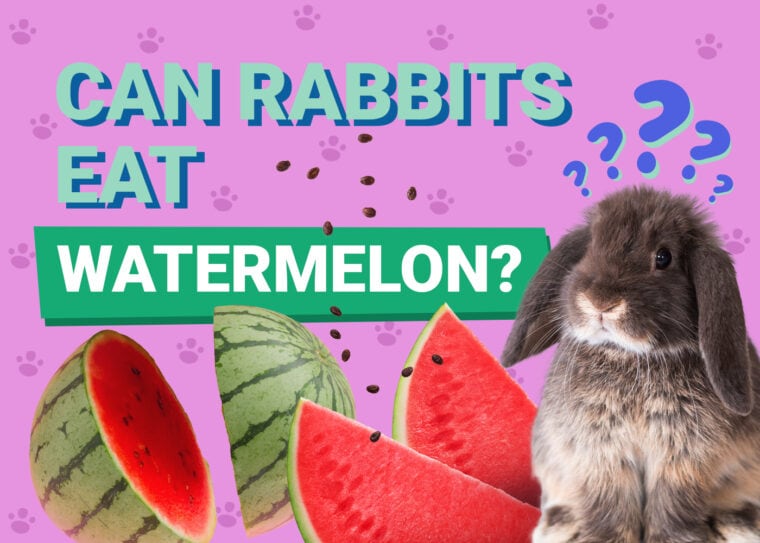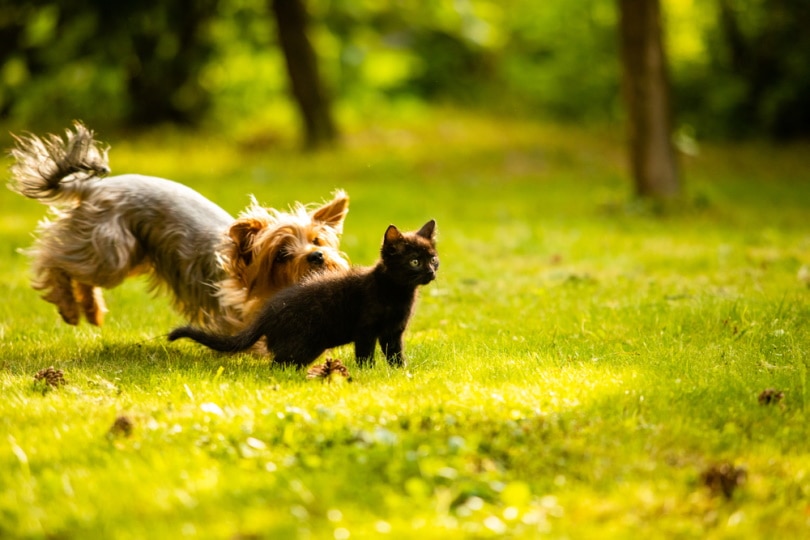
Watermelons are a summertime barbecue staple because it is sweet, juicy, and thirst-quenching. But did you know that, technically, watermelons are a berry? That’s right! While they may be melons by name, they’re berries by nature.
But are watermelons safe for your pet rabbit to eat? What about their seeds? And if you do feed your rabbit a watermelon, is it okay for it to eat the rind, too?
Rabbits can eat watermelon sparingly as an occasional treat, and most will do so with surprising gusto! However, fruit is not a natural part of a rabbit’s diet and may cause significant health and digestive issues, so it’s important to err on the side of caution. We go into detail on nutrition facts, as well as a few things you absolutely must avoid when feeding your rabbit watermelon. By the end of this guide, you’ll be fully informed and ready to decide whether watermelon is a good choice in your rabbit’s diet.
Yes! Rabbits Can Eat Watermelon
It’s no great secret that most pet rabbits have quite a sweet tooth and the rich, succulent flesh of a watermelon is a treat they’ll surely enjoy.
As much as most rabbits love watermelon, it’s not a particularly nutrient dense food. This means that, as a rule, you should reserve it as an occasional treat rather than a daily foodstuff, as they will not reap any real benefits from it. Fruits may cause gut stasis, diarrhea, or other digestive issues in rabbits.
Nutrition Facts for Watermelon
USDA gives the details of watermelon as a very nutritionally absent food: Composed almost entirely of sugars and water, its calorie content, when water is removed, is almost entirely carbohydrates (with very little fiber), protein, and fat. With no significant content of vitamins or minerals to speak of it’s a very, well, watery fruit.
Health Benefits and Dangers of Watermelon for Rabbits
Watermelons have no particular health benefits to speak of for rabbits; their relatively low nutrient content and high amount of sugar make them a treat best served very infrequently, or skipped altogether. However, unlike humans, rabbits can eat watermelon rind, making it a useful source of dietary fiber that’s hard to find in other sweet rabbit treats.
How to Feed Your Watermelon to Your Rabbits
Always choose an organic watermelon for your rabbit, as its absence of pesticides and waxes will mean that you can also feed them the healthier rind. It’s important to note that rabbits cannot digest watermelon seeds! Their very mild toxicity can lead to serious digestive issues if consumed in excess, meaning that you should either buy seedless watermelons or take the time to chop up and de-seed any watermelon you plan on feeding to your rabbit.
Still, it’s unlikely that your rabbit would experience toxicity due to cyanide, oxalate, saponine, and other potentially harmful content, but it’s better to be safe than sorry. For this, the seeds should be chewed through, and they may also pose a choking hazard for some rabbits or lead to digestive issues.

How Much Watermelon Should I Feed My Rabbit?
Because of its very watery and sugary composition, it would be best to avoid feeding watermelon in the first place. But if you would still prefer to offer it to your bunny, always feed it in moderation and only on special occasions. For small rabbits, a one or two bite-sized cubes will be plenty as an occasional treat, while larger rabbits might be able to enjoy a little bit more without going overboard on sugar.
Excess of carbs is not healthy for your rabbit and may lead to a digestive disorder, such as diarrhea, bloat, gut stasis, etc. Inadequate diet lacking in fiber will consequently lead to various dental issues and improper teeth wear. Speak to your vet about any changes in your rabbit’s diet and about appropriate snacks to use.
Hay and grass should make around 85% of a rabbit’s daily food intake, followed by leafy greens and vegetables with a small amount of pelleted food, while fruits should be offered sparingly due to their sugar content. Fruits and veggies together should make no more than 10% of their daily intake.
Types of Watermelon to Feed Your Rabbit
Whenever possible, you should buy seedless, organic watermelons to feed your rabbit. This ensures their complete safety for your bunny: No pesticides or waxes will be present on the rind, and having no seeds will prevent any gastrointestinal problems. We are particularly fond of the “personal size” seedless watermelons seen in stores during summer. Chop one into small cubes and you can share it right next to your rabbit!
Final Thoughts
Fruits are not a significant part of a wild rabbit’s diet in most cases, unless food sources are very scarce, and fruits may lead to health issues when offered to pet rabbits. Though it’s far from being a nutritionally dense food, watermelon can potentially be an occasional treat for your bunny, but the risk of gut stasis or diarrhea cannot be completely ruled out, particularly depending on the amount.
Consult with your vet about nutritional options for your rabbit, and do not forget that hay is the most important part of a rabbit’s diet, ensuring their digestive health and gut bacteria balance. Buy seedless, organic watermelons to make yours and your rabbit’s life easier if you decide to try this fruit, and keep the feeding frequency to just once or twice a week.
Thank you for reading! We hope this guide has taught you everything you wanted to know about feeding watermelon to your rabbits. For other sweet indulgences that are safe for your bunny, see our other articles on blueberries and strawberries, as well!










